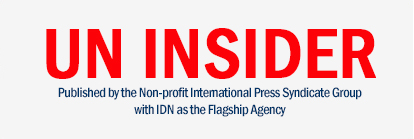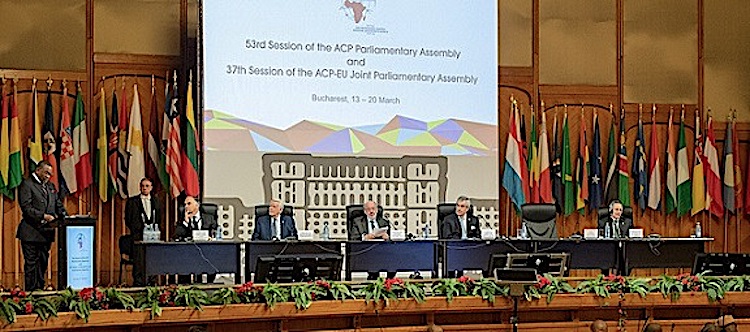By Robert Johnson
BRUSSELS | BUCHAREST (ACP-IDN) – Migration, rule of law, climate change, ACP-EU relations beyond 2020, renewable energies and education were among issues discussed at the 37th ACP-EU Joint Parliamentary Assembly (JPA) in Bucharest.
From March 18 to 20, 2019, the Assembly brought together Members of the European Parliament and representatives from developing countries in Africa, the Caribbean and the Pacific in Bucharest, Romania.
The JPA formally opened on March 18 by Louis Michel and Joseph Owana Kono, co-presidents of the Joint Parliamentary Assembly (JPA), Maria-Magdalena Grigore, State Secretary in the Romanian Ministry of Foreign Affairs and Călin Popescu Tăriceanu, President of the Romanian Senate.
Members engaged in a debate with Neven Mimica, European Commissioner for international cooperation and development, on the post-Cotonou negotiations and on the EU-UN initiative to eliminate violence against women and girls.
The Global Compact on migration was the subject of the keynote debate. The Assembly also discussed the impact of Brexit on the ACP-EU partnership.
On March 20, the joint parliamentary committees on Political Affairs, on Economic Development, Finance and Trade, and on Social Affairs and the Environment voted on three reports on:
- the strategic dimension of the ACP-EU partnership.
- the possibilities of renewable energies in bringing sustainable economic development to ACP countries, and particularly to the remote areas;
- reducing the global number of out-of-school youths in ACP countries;
The JPA also adopted two resolutions on the challenges linked to the rule of law in the European Union and the ACP countries, and on environmental crimes.
The ACP-EU Joint Parliamentary Assembly (JPA) brings together Members of the European Parliament and representatives of the African, Caribbean and Pacific states that have signed the Cotonou Agreement, which is the basis for ACP-EU cooperation and development work.
At the opening of the 53rd session of the ACP Parliamentary Assembly on March 15, ACP Secretary-General Dr Patrick I. Gomes shared recent developments in the post-Cotonou negotiations as well as an update on the activities of the ACP Council of Ministers.
On the Secretariat’s Budget for Financial Year 2019, Dr Gomes said, the Budget for 2019 approves expenditure of €16,035,346, with the contribution from ACP Member States amounting to 59.78% and that from the European Development Fund (EDF) amounting to 40.22%. The expectation that 79 member states of the ACP will fulfill their financial responsibilities to provide a total assessed contribution of approx. €9mn is both reasonable and realistic."
He asked: "Why then do we continue to fail and if we reach 7 million that is a good year. It shows lip service to unity and solidarity stemming from an ingrained dependent mentality."
Dr Gomes added: "We must first free ourselves from mental slavery, about which Bob Marley sang – if we are to have a global impact. So much ingrained in receiving donor funds from the EDF, the reciprocal, modest responsibility to meet our obligations appear of secondary or no importance – please engage with your Ministries of Finance."
He pointed out that 9th ACP Summit of Heads of State and Government shall be held in 2019, and welcomed and accepted the offer of Uganda. However due to a major event on South-South Cooperation to be hosted late in 2019 Uganda is willing to host the Summit in 2020.
At the Opening Ceremony of the 37th Session of the ACP-EU Joint Parliamentary Assembly, Joseph Hyacinthe Owona kono, ACP Co-President underlined that the assemblage of African, Caribbean, and Pacific entities must be non-negotiable.
"It is this configuration that has brought us this far. We MUST therefore resist any attempt, however subtle or discreet, to separate the A – C – P. Such a separation would serve to fuel scepticism in the ACP and beyond, suggesting an intention to divide and rule Africa, the Caribbean and the Pacific," he said.
This dangerous vulnerability, he added, would also serve to strengthen the convictions of sceptics of ACP-EU cooperation, who see it as "a more explicit attempt to preserve imperialist objectives under the guise of streamlined cooperation". As such, he appealed to "our colleagues and friends in the European Parliament" to stand together against any such tendencies. [IDN-InDepthNews – 21 March 2019]
Photo: The 37th plenary of the Joint Parliamentary Assembly (JPA) was formally opened on 18 March in Bucharest, Romania. Credit: ACP Press
This report is part of a joint project of the Secretariat of the ACP Group of States and IDN, flagship agency of the International Press Syndicate.
facebook.com/IDN.GoingDeeper - twitter.com/InDepthNews - twitter.com/acp_idn





